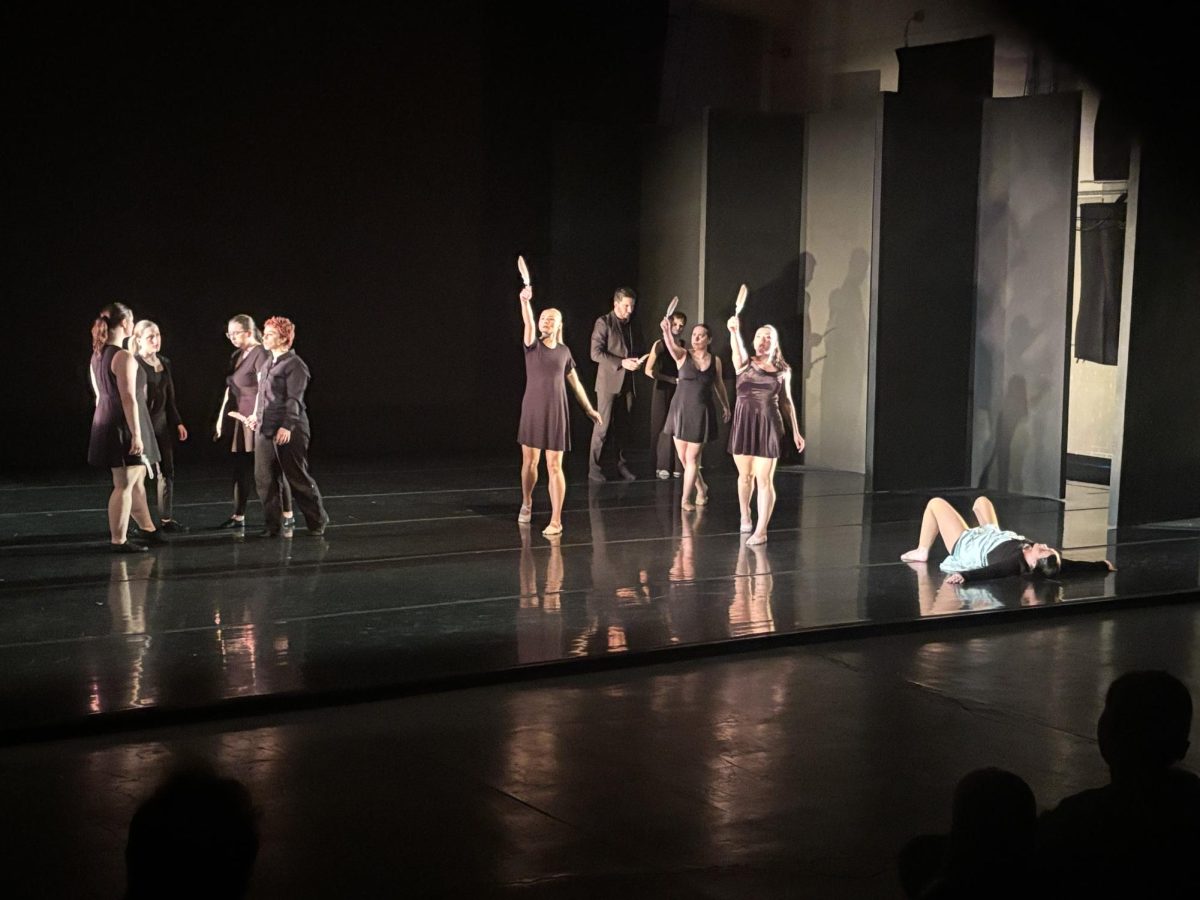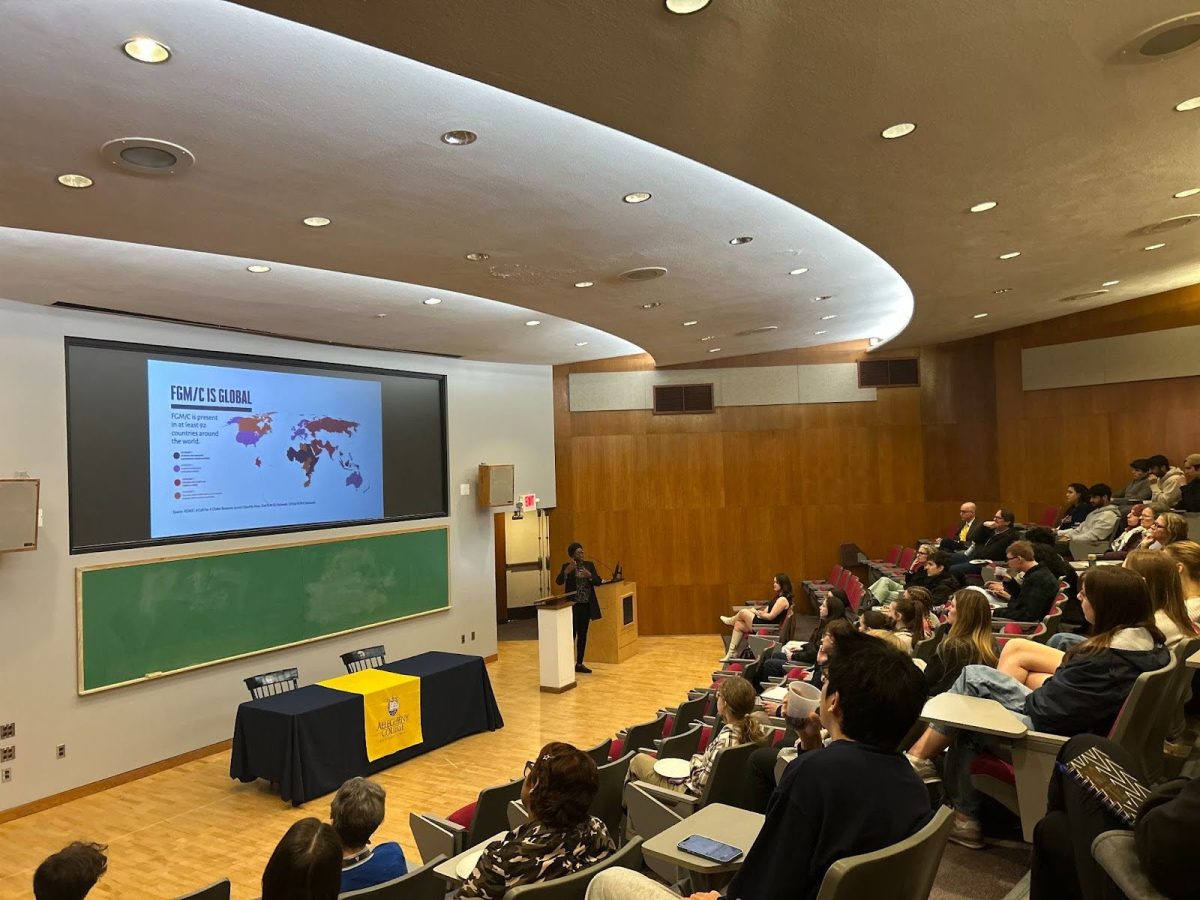The Merrick Archives Center holds many treasures of Allegheny’s past. Located on the second floor of the Lawrence Lee Pelletier Library, the Archival Center is home to materials from Allegheny’s history, like the literary journal The Fourth Wall, published from 1990 to 1994 and Allegheny’s original library collection.
The keeper of all of these collections is Archives & Special Collections Librarian Chris Anderson, who just arrived at Allegheny three short months ago. His background in religious studies and archival research led him to travel far and wide, but he has now found comfort once again in a small liberal arts college.
“My original plan was to go into church work, and Methodist church work, and I did that for a couple years, and realized — because my parents are both retired ministers — so I thought well I’ll follow them as some kids do,” Anderson said. “And a couple years in, I realized that I really don’t think that this is my thing.”
Anderson appreciated all of the educational opportunities that the church gave him, but decided to go to graduate school to pursue a new path. It was there in graduate school that Anderson realized he enjoyed teaching — specifically, U.S. religious history. So, he taught for several years in Kansas while coaching sports and then earned his doctorate at Drew University.
While he was working on his Ph.D., he also worked as a student in the university’s Methodist archives.
“Being around archives, and then in grad school using archival material for my dissertation, and for my graduate work, I realized I really enjoyed being around old books, and around original sources,” Anderson said.
He believes that since we are so consumed with secondary sources, it is even more special and fascinating to look at the original source. For Anderson, one of the best parts of his work is getting to draw his own conclusions about pieces of history.
“I really like that about archival material and primary sources,” Anderson said. “That you can come in and say, ‘I want to look at this hand-written journal or this diary.’ And as you’re reading it — at least it’s done it for me — you are bringing your own interpretation onto that document. And then you write about it and that becomes your perspective and then you inform it by secondary sources.”
At an Archival Center open house just two weeks ago, Anderson highlighted letters to Ida Tarbell, ’80, a muckraking journalist from the 19th century who is one of Allegheny’s best known graduates.
“I was talking with a student about how important these letters are,” Anderson said. “Someone’s not writing a book about Tarbell, I mean there’s lots of books about Tarbell, but when you look at this letter, this is an original source, you are the one interpreting it, and you can give it your own perspective.”
The part of Anderson’s job that he appreciates the most is connecting students with archival material applicable to their interests and school work, or to have the Archival Center be a primary source that they look into. He wants students to be able to connect with “really old stuff” and find a purpose for these archives.
When Anderson was a graduate student, he read a set of diaries written by a women who had just married a Methodist missionary and was struggling with having to leave her family and travel to Korea with her new husband.
“She started talking about ordering plants and building a home away from home, and what it did for me was sort of give perspective to fill in gaps of the story, this person’s feelings, perspective, first-hand account of leaving,” Anderson said. “I think today it’s similar, but it’s very different in the sense that you and I could go to Norway and we could quickly text or email. But letters took a while, they had to deliver them, and it took weeks sometimes to get updates, and so I think that was something that struck me.”
Anderson hopes that he can make more students aware of what the Archival Center has to offer.
“I say the ‘cool stuff,’” Anderson said, “but the fascinating, interesting items that we have here that I don’t think a lot of people know about here on campus.”
Before landing in Allegheny’s Archival Center, Anderson worked at Drew University, Yale University and then at Princeton Seminary with archives and special collections.
“I enjoy the smaller environment,” Anderson said. “Yale isn’t huge but there were 12-13,000 students there. I enjoy working in smaller contexts, and I’ll be walking up to the student center and I’ll see a student and be like, ‘Hey what’s up!’ It’s a smaller context and you run across people more often.”
While working at The United Methodist Church Archives at Drew University, Anderson traveled internationally to do archival research.
“They sent me around the world to work on — to find archival materials,” Anderson said. “I went to several meetings, and I spent three weeks in Norway and Oslo working on a Methodist bishop who passed away. I’m working on going through his library and his papers and trying to make sense of them, and I was able to open a small research center in Norway, which was kind of fun.”
He also recalled experiences outside of his normal archival work.
“Those trips allowed me to do some fun stuff in the sense that I met one of the lords from The House of Lords,” Anderson said, “and I was with one of my colleagues from the Methodist archives, and he gave us an insider’s tour of Parliament, which was pretty cool.”
Anderson said he never expected to be taken all over the world.
“My thought was to continue to teach and coach sports in a small liberal arts school somewhere in the midwest,” Anderson said. “I then started working in this type of environment and felt like I found my niche.”
There is purpose in everything, including the archival material that rests in the Pelletier Library.
“One of the things that we do that are intentional is we’re collecting, promoting and making available stories, Allegheny stories primarily,” Anderson said.
Part of Anderson’s work includes archiving materials from current clubs and events, meaning he regularly asks students to send him posters, flyers and other records.
“We are sort of building — telling a story about you as students in 2024, not so much for you right now, but the students in the year 2075, whatever they look like and who they are,” Anderson said. “Hopefully Allegheny will still be here, I’m sure it will. We are preserving and keeping stories about ‘What was a student like in 2024?’”
Categories:
Searching through the Archives with Dr. Anderson
Story continues below advertisement
0
Tags:
More to Discover






